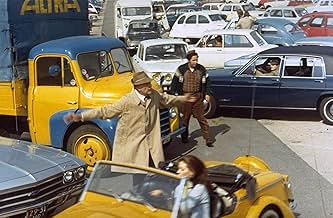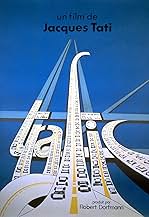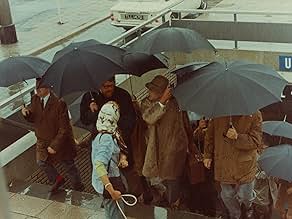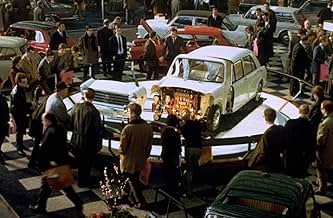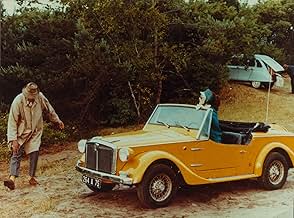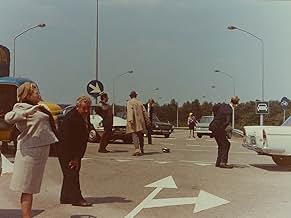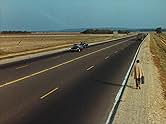IMDb रेटिंग
7.0/10
8.1 हज़ार
आपकी रेटिंग
अपनी भाषा में प्लॉट जोड़ेंMr. Hulot drives a recreational vehicle from Paris to Amsterdam in his usual comical, disastrous style.Mr. Hulot drives a recreational vehicle from Paris to Amsterdam in his usual comical, disastrous style.Mr. Hulot drives a recreational vehicle from Paris to Amsterdam in his usual comical, disastrous style.
- निर्देशक
- लेखक
- स्टार
- 1 BAFTA अवार्ड के लिए नामांकित
- 1 जीत और कुल 1 नामांकन
Jacques Tati
- Monsieur Hulot
- (as Mr. Hulot)
Honoré Bostel
- Director of ALTRA
- (as Honore Bostel)
François Maisongrosse
- François
- (as F. Maisongrosse)
Marco Zuanelli
- Mechanic
- (as Mario Zanuelli)
फ़ीचर्ड समीक्षाएं
Tati's final theatrical film, which is often considered his greatest failure, is in actuality nearly as good as his masterpieces. In this film, Tati stars for the fourth and final time as M. Hulot. This time he has a job as an automobile designer, and it is his job to get his company's new Camping Car to Amsterdam for a big auto show. Accompanying him is a driver, François, and a public relations worker, Maria (played marvelously by Maria Kimberly, who reminds us of the great lead actress roles played by Nathalie Pascaud and Barbara Denneck in M. Hulot's Holiday and Playtime respectively). Maria drives around in a little yellow convertible with her little fur-ball dog. Its fast and maneuverable. It can go pretty much anywhere it wants. Unfortunately, François and M. Hulot are driving a large truck. They often get into trouble when they're trying to follow Maria's car. Every problem that can happen does. Many observations are made about how people act when they're in their cars on the highway (it's a non-stop traffic jam from Paris to Amsterdam). The jokes in Traffic are always hilarious. The first fifteen or twenty minutes are somewhat dry of them, which is mainly why I don't rank this one up there with M. Hulot's Holiday, Mon Oncle, and Playtime (it's about even with Jour de fête). But when it gets going, it never stops. And it's beautiful, too, just as all of his other films. The final sequence is sublime, and the final shot will stay with me forever. 9/10.
What can we make of Trafic, Jacques Tati's last film? It certainly isn't a major success, as M. Hulot's Holiday and Mon Oncle are. It's not a gallant failure, as I believe Playtime is. It seems to me that it is a sad, sometimes amusing combination of those things that made Tati so unique, so funny, so problematic and so drawn to making mundane social commentary. There must be something in the water we drink or the bread we eat that causes some humans with extraordinary artistic gifts to believe that because they are great artists they also must have equally great gifts of social philosophy, gifts which they are determined to share with us.
By the time Tati made Trafic, four years after Playtime, he had lost ownership of his life's work, his films, and most of his money. Playtime was a debacle. He spent a fortune, his own as well as others, to craft a perfectionist's dream of artistic control. He ended up with a movie that was filled with surprises, layer on layer of -- for wont of a better term -- sight and sound gags, with fascinatingly complex amusements for an audience willing to let the situations develop around them, and seemingly endless, obvious and often impersonal visual commentary on the homogenizing of modern society and the perils of technology. Most moviegoers were not all that interested.
Now, with Trafic, Mr. Hulot has come back. He is a designer for a Paris auto company, and he has developed a camping vehicle like no other. Trafic is the story of Mr. Hulot's delivery of his camper from Paris to an international auto show in Amsterdam. It's a long journey filled with misunderstandings, accidents and crashes, a PR executive with an endless number of dress changes, cops, windshield wipers and a lot of cars. The movie is as exquisitely built as an expensive vest pocket timepiece. Unfortunately, time has a way of catching us up, and Mr. Hulot now is a man past middle age, where male innocence seems unlikely and somewhat unattractive. Tati was 64 now, and he looks it. The gentle, innocent mime who meets unexpected personal situations at a small seaside hotel or tries to help his young nephew has been replaced by a well-meaning older gentleman we more often observe than we root for. His encounters with the clichés of faceless technology and bumbling bureaucracy are increasingly with people with few understandable, sympathetic foibles. Mr. Hulot to be at his best needs people we can come to like and interact with, not simply interchangeable stand- ins...even if they're picking their noses in the privacy of their cars (in a sight gag probably only Tati could have pulled off).
Mr. Hulot only appeared in four feature-length movies. It is Tati's genius that in less than 500 minutes he gave us such a memorable and appealing human being. Tati's layering of sight gags is unique and often intensely and unexpectedly funny. With Trafic, however, I found my interest more intellectual than anything else. There were stretches of the film that simply weren't all that engaging. And this, of course, is all just opinion.
By the time Tati made Trafic, four years after Playtime, he had lost ownership of his life's work, his films, and most of his money. Playtime was a debacle. He spent a fortune, his own as well as others, to craft a perfectionist's dream of artistic control. He ended up with a movie that was filled with surprises, layer on layer of -- for wont of a better term -- sight and sound gags, with fascinatingly complex amusements for an audience willing to let the situations develop around them, and seemingly endless, obvious and often impersonal visual commentary on the homogenizing of modern society and the perils of technology. Most moviegoers were not all that interested.
Now, with Trafic, Mr. Hulot has come back. He is a designer for a Paris auto company, and he has developed a camping vehicle like no other. Trafic is the story of Mr. Hulot's delivery of his camper from Paris to an international auto show in Amsterdam. It's a long journey filled with misunderstandings, accidents and crashes, a PR executive with an endless number of dress changes, cops, windshield wipers and a lot of cars. The movie is as exquisitely built as an expensive vest pocket timepiece. Unfortunately, time has a way of catching us up, and Mr. Hulot now is a man past middle age, where male innocence seems unlikely and somewhat unattractive. Tati was 64 now, and he looks it. The gentle, innocent mime who meets unexpected personal situations at a small seaside hotel or tries to help his young nephew has been replaced by a well-meaning older gentleman we more often observe than we root for. His encounters with the clichés of faceless technology and bumbling bureaucracy are increasingly with people with few understandable, sympathetic foibles. Mr. Hulot to be at his best needs people we can come to like and interact with, not simply interchangeable stand- ins...even if they're picking their noses in the privacy of their cars (in a sight gag probably only Tati could have pulled off).
Mr. Hulot only appeared in four feature-length movies. It is Tati's genius that in less than 500 minutes he gave us such a memorable and appealing human being. Tati's layering of sight gags is unique and often intensely and unexpectedly funny. With Trafic, however, I found my interest more intellectual than anything else. There were stretches of the film that simply weren't all that engaging. And this, of course, is all just opinion.
Whilst not Tati's best by any stretch of the imagination the genius of the man still shines through. Having lived in France for a while I see more humour in this film, particularly in the comedic observation, than before. The French may be fanatical about cinema and may well have produced some of the world's greatest film makers but out and out comedy probably ranks well down in terms of output. Maybe it's something to do with the French sense of humour (whatever that may be). Unlike British, and to a lesser extent US comedy, self-parody is not a French strength. It could be something to do with their history and education but the culture, so strong in literature and the arts seems not to demean itself with pure laughter. Most cinema fans would probably be hard put to list 10 French comedies - other than perhaps drama with the occasional comic undertones. Les Visiteurs (the original not the recent re-make) is probably one of the better examples but here again there's little or no self-mocking.
So it was left to Tati to mine the seam - and how well he mined it. Here he takes the smallest of French (dare I say Parisian) mannerisms and extends them into lengthy scenes of beautifully observed comedy. Whether it's the windscreen wipers in tune with the occupants or the nose-picking drivers, he asks the French to at least smile, if not laugh out loud, at themselves.
Yes, the film does move at rather a slow pace and there are times when the comic observation sags, but the sight of dear old M Hulot in his mackintosh, loping along with pipe jutting from his mouth will ever remain one of cinema's delights.
So it was left to Tati to mine the seam - and how well he mined it. Here he takes the smallest of French (dare I say Parisian) mannerisms and extends them into lengthy scenes of beautifully observed comedy. Whether it's the windscreen wipers in tune with the occupants or the nose-picking drivers, he asks the French to at least smile, if not laugh out loud, at themselves.
Yes, the film does move at rather a slow pace and there are times when the comic observation sags, but the sight of dear old M Hulot in his mackintosh, loping along with pipe jutting from his mouth will ever remain one of cinema's delights.
Jacques Tati's final Hulot film concerns an attempt to get a camper car from Paris to the Amsterdam car show. Its Hulot on the road.
Made in the wake of the disastrous reception of Play Time this was Tati pretty much doing a contract work to get some money. The result is a less refined film than either of his previous two films, much of the film being less precise gags and set pieces, rather its the insanity of just getting from here to there. Filled with people this is possibly the most alive of the four Hulot films. There are what passes for close ups and we we see everyone as individuals and not merely as ants marching in sterile environments. Its a real world film something none of the preceding Hulot films really is.
For those who have seen the three previous films this is a film where details are filled in. Where Mon Oncle had Hulot looking for a new job, here we see the one that he finds, working in auto design. We also get to finally see his ever present umbrella opened. Most interesting is the fact that there is perhaps a hint of romance or if not real romance the sense that he is not an isolated human being. This is the film where the character finally comes to life as something more than a character.
For many people this is a lesser Tati film. It doesn't have the ideas of the previous two films. Outside of the camping car there is no real set piece to make your intellect marvel. The film is not a mediation of grand ideas, there are some, but when you get down to it its a comedy. A real laugh out loud comedy that is almost the exact opposite of Play Time where most of the humor brings smiles but not belly laughs.
I think its a very good film. Certainly its not his best, I would have to say that would be Hulot's Holiday since it mixes the intellectual humor with the belly laugh. This I would probably put as second simply because I genuinely laughed repeatedly at this film, something I didn't do with Mon Oncle and Play Time. I think a good argument could be made for the film being better than its reputation (The laughs, the sense of life and people, and even the lack of pretension). I will agree its not a great film, it does suffer from the meandering that Play Time and Oncle have, but it is a funny one.
If you like any of the earlier films see this movie. If you like funny comedies I also suggest you try this film. It may not go down as your favorite film but I'm pretty sure you will laugh at it, which is all I think it was ever designed to do.
Made in the wake of the disastrous reception of Play Time this was Tati pretty much doing a contract work to get some money. The result is a less refined film than either of his previous two films, much of the film being less precise gags and set pieces, rather its the insanity of just getting from here to there. Filled with people this is possibly the most alive of the four Hulot films. There are what passes for close ups and we we see everyone as individuals and not merely as ants marching in sterile environments. Its a real world film something none of the preceding Hulot films really is.
For those who have seen the three previous films this is a film where details are filled in. Where Mon Oncle had Hulot looking for a new job, here we see the one that he finds, working in auto design. We also get to finally see his ever present umbrella opened. Most interesting is the fact that there is perhaps a hint of romance or if not real romance the sense that he is not an isolated human being. This is the film where the character finally comes to life as something more than a character.
For many people this is a lesser Tati film. It doesn't have the ideas of the previous two films. Outside of the camping car there is no real set piece to make your intellect marvel. The film is not a mediation of grand ideas, there are some, but when you get down to it its a comedy. A real laugh out loud comedy that is almost the exact opposite of Play Time where most of the humor brings smiles but not belly laughs.
I think its a very good film. Certainly its not his best, I would have to say that would be Hulot's Holiday since it mixes the intellectual humor with the belly laugh. This I would probably put as second simply because I genuinely laughed repeatedly at this film, something I didn't do with Mon Oncle and Play Time. I think a good argument could be made for the film being better than its reputation (The laughs, the sense of life and people, and even the lack of pretension). I will agree its not a great film, it does suffer from the meandering that Play Time and Oncle have, but it is a funny one.
If you like any of the earlier films see this movie. If you like funny comedies I also suggest you try this film. It may not go down as your favorite film but I'm pretty sure you will laugh at it, which is all I think it was ever designed to do.
'Trafic (1971)' - with one 'f' - isn't about drugs, it's about cars. More specifically, it's about the chaos of car travel, the mishaps and hiccups that occur when driving a metal box from one location to another. With a more clear narrative drive than its predecessors, Mr. Hulot's final outing sees its clumsy main character accompany a camping car he's designed to a trade show in Amsterdam. The perpetually pleasant protagonist actually has a job this time, and he's dedicated to doing it as well as he possibly can - which, of course, isn't as well as his employers would like. This mildly amusing comedy isn't particularly funny, but it has a handful of humourous moments and it's generally pleasant. It ambles about amiably, and it somehow never comes close to being boring despite the fact that its slow pacing emphasises the gaps between its giggles. Its ambition is scaled back when compared to 'Playtime (1967)' and it lacks that superior picture's truly scrumptious production design, but it's more compelling - and chucklesome - than 'Monsieur Hulot's Holiday (1953)' and 'Mon Oncle (1958)'. It isn't brilliant, but it's enjoyable enough for what it is. It's a very specific sort of experience, one almost exclusive to its series. Personally, this type of film is hit or miss for me. Now I've seen all of Hulot's outings, I can safely say I actively enjoyed two of them. However, I can see how some people would enjoy them all, and to a much higher degree than I do. This final Hulot film is well-made, charming and fairly amusing. It's a bit of an odd coda to 'Playtime (1967)', which is considered a masterpiece by many, but it's a solid effort nevertheless.
क्या आपको पता है
- ट्रिवियाThe end scene (people walking with umbrellas between parked cars) was shot on the parking lot of the then still functioning Amsterdam Ford factory.
- गूफ़Several (Dutch) license plates can be seen on various different vehicles, sometimes even in the same shot. For instance the license plate "FT-92-65" can be seen in the petrol station scene on both a Peugeot 504 and a Chrysler 180. Later the same plate is on a Peugeot 204 passing in front of the exhibition center. In the "road rage" scene the number 76-04-NF is on both the Renault 16 and the Citroën ID. Shortly after the same plate is on an Opel Kadett parked in front of the exhibition center.
- भाव
Radio Announcer: The Cyclone 70. A new raincoat... especially made for the sun.
- क्रेज़ी क्रेडिटIn the opening credits, Tati is billed simply as "M. Hulot." He does, of course, use his real name for his writing and directing credits.
- कनेक्शनFeatured in Omnibus: Monsieur Hulot's Work (1976)
टॉप पसंद
रेटिंग देने के लिए साइन-इन करें और वैयक्तिकृत सुझावों के लिए वॉचलिस्ट करें
- How long is Traffic?Alexa द्वारा संचालित
विवरण
- रिलीज़ की तारीख़
- कंट्री ऑफ़ ओरिजिन
- आधिकारिक साइट
- भाषाएं
- इस रूप में भी जाना जाता है
- Traffic
- फ़िल्माने की जगहें
- उत्पादन कंपनियां
- IMDbPro पर और कंपनी क्रेडिट देखें
बॉक्स ऑफ़िस
- दुनिया भर में सकल
- $51,348
- चलने की अवधि1 घंटा 36 मिनट
- ध्वनि मिश्रण
- पक्ष अनुपात
- 1.37 : 1
इस पेज में योगदान दें
किसी बदलाव का सुझाव दें या अनुपलब्ध कॉन्टेंट जोड़ें


